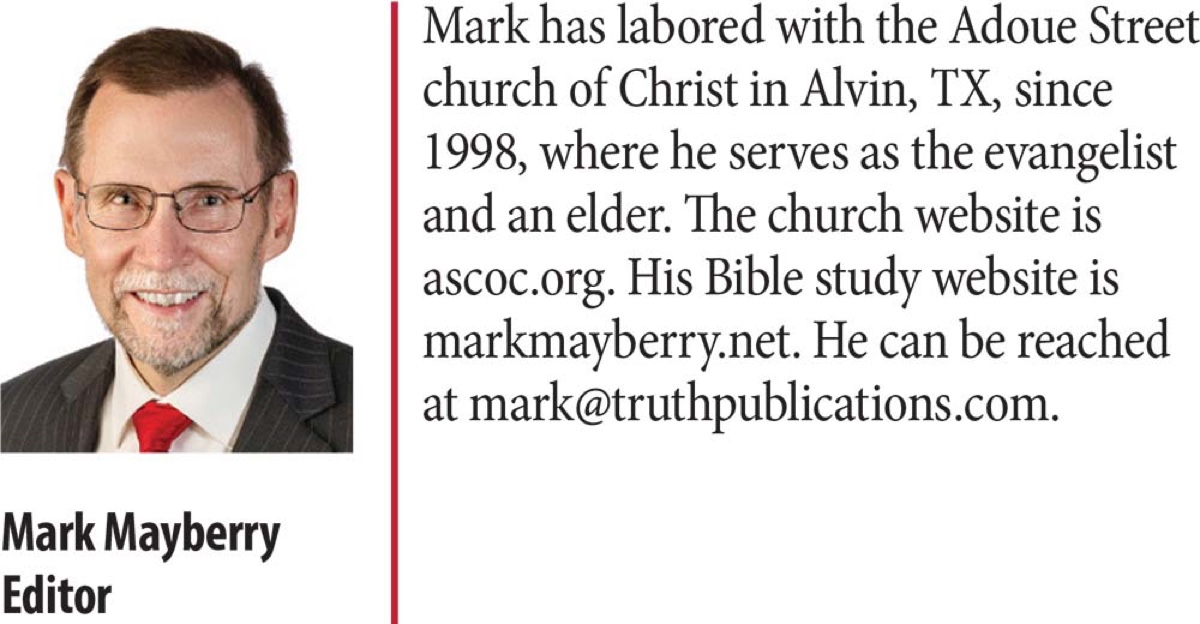
by Mark Mayberry
Synopsis: Evil attitudes, a spirit of factionalism, doctrinal error, and false teaching all break the bond of fellowship. This principle applies both vertically and horizontally.
The divine command, “You shall be holy, for I am Holy,” repeatedly occurs in the Old and New Testaments (Lev. 19:1-2; 1 Pet. 1:13-16). During the Mosaic era, holiness was defined in terms of conformity to God’s law regarding physical cleanliness/uncleanness (Lev. 11:44-45; 20:22-26), regarding morality (Ps. 106:34-39), and regarding worship (Lev. 10:1-3). In the present Christian era, the Mosaic code governing clean and unclean foods has been set aside (Col. 2:13-14, 20-23; cf. Acts 10:9-16). Instead, holiness is defined in moral and spiritual terms—confirming to God’s pattern in all areas of life (including worship), and abstaining from sinful lusts that war against the soul (1 Pet. 1:13-16; 2:4-12).
Sin breaks the bonds of fellowship between God and man. Moses recognized this reality: “For we have been consumed by Your anger and by Your wrath we have been dismayed. You have placed our iniquities before You, our secret sins in the light of Your presence. . .” (Ps. 90:7-12, esp. v. 7). Isaiah echoed the same truths:
Hear the word of the LORD, you rulers of Sodom;Give ear to the instruction of our God, you people of Gomorrah. What are your multiplied sacrifices to Me? says the LORD. I have had enough of burnt offerings of rams and the fat of fed cattle; and I take no pleasure in the blood of bulls, lambs or goats. When you come to appear before Me, who requires of you this trampling of My courts? Bring your worthless offerings no longer, incense is an abomination to Me.New moon and sabbath, the calling of assemblies—I cannot endure iniquity and the solemn assembly. I hate your new moon festivals and your appointed feasts, they have become a burden to Me; I am weary of bearing them. So when you spread out your hands in prayer, I will hide My eyes from you; Yes, even though you multiply prayers, I will not listen. Your hands are covered with blood (Isa. 1:10-15).
Behold, the LORD’S hand is not so short that it cannot save; nor is His ear so dull that it cannot hear. But your iniquities have made a separation between you and your God, and your sins have hidden His face from you so that He does not hear. For your hands are defiled with blood and your fingers with iniquity; your lips have spoken falsehood, your tongue mutters wickedness. No one sues righteously and no one pleads honestly. They trust in confusion and speak lies; they conceive mischief and bring forth iniquity. They hatch adders’ eggs and weave the spider’s web; he who eats of their eggs dies, and from that which is crushed a snake breaks forth. Their webs will not become clothing, nor will they cover themselves with their works; their works are works of iniquity, and an act of violence is in their hands. Their feet run to evil, and they hasten to shed innocent blood; their thoughts are thoughts of iniquity, devastation and destruction are in their highways. They do not know the way of peace, and there is no justice in their tracks; They have made their paths crooked, whoever treads on them does not know peace (Isa. 59:1-8).
The blessed bond of fellowship between God and His people is restored and maintained through repentance, sanctification, and renewed commitment to His cause and code of conduct (Isa. 1:18-20; 2 Cor. 6:14-18; Eph. 5:6-14). Jesus, the prophesied Messiah, is our peace. He abolished the distinction between Jew and Gentile, making both one, reconciling all to God through His shed blood (Eph. 2:11-22).
What about the spiritual relationship that we share with fellow Christians in both a congregational setting (Rom. 16:14; 1 Cor. 16:20), and in the broader sense of the brotherhood (Rom. 16:16; 1 Pet. 2:17)? The bond is broken when a brother sins against a brother, but refuses all private and public attempts designed to lead him to repentance (Matt. 18:15-17). It is broken when an individual causes dissensions and hinderances contrary to the gospel (Rom. 16:16-20). It is broken when one pursues a sinful lifestyle (1 Cor. 5:9-13). It is broken when one leads an unruly life and refuses to follow the traditions/instructions received from inspired apostles (2 Thess. 3:6-13). It is broken when one manifests a factional spirit (Titus 3:8-11). It is broken when one does not abide in the doctrine of Christ—which is inclusive, not only of who Jesus is but also of what Jesus taught (2 John 7-11).
Christianity is more than paying lip-service to pious platitudes—instead, we must be doers of the word (Jas. 1:21-22). Sin is serious business: eternity hangs in the balance.
The bonds of spiritual fellowship are broken by sin and restored through genuine repentance. This is well illustrated by the tragic examples of David (Ps. 32:1-7) and the Corinthians (2 Cor. 7:11).
It is also affirmed in the Apocalypse. The church at Ephesus was told, “Therefore remember from where you have fallen, and repent and do the deeds you did at first; or else I am coming to you and will remove your lampstand out of its place—unless you repent” (Rev. 2:5). The church in Pergamum was told, “Therefore repent; or else I am coming to you quickly, and I will make war against them with the sword of My mouth” (Rev. 2:16). The church at Thyatira (which was tolerating a wicked false teacher in their midst) was admonished: “But I have this against you, that you tolerate the woman Jezebel, who calls herself a prophetess, and she teaches and leads My bond-servants astray so that they commit acts of immorality and eat things sacrificed to idols. I gave her time to repent, and she does not want to repent of her immorality. Behold, I will throw her on a bed of sickness, and those who commit adultery with her into great tribulation, unless they repent of her deeds. And I will kill her children with pestilence, and all the churches will know that I am He who searches the minds and hearts; and I will give to each one of you according to your deeds”(Rev. 2:20-23). Erring saints at Sardis were commanded: “So remember what you have received and heard; and keep it, and repent. Therefore, if you do not wake up, I will come like a thief, and you will not know at what hour I will come to you” (Rev. 3:3). After rebuking the lukewarm Laodiceans, Jesus said, “Those whom I love, I reprove and discipline; therefore be zealous and repent” (Rev. 3:19).
The bond of spiritual fellowship is restored as faithful brethren refuse to countenance error, courageously take a stand for truth, and lovingly practice biblical discipline. When properly administered and received, such expressions of “tough love” help the offender recognize his lost condition, leading to genuine repentance and full restoration (2 Cor. 7:5-16; 2 Thess. 3:14-15). The prophet Nathan possessed such a spirit when he courageously confronted King David, and said, “You are the man!” (2 Sam. 12:1–12, esp. v. 7). May we also manifest similar conviction and compassion in restoring erring sinners:
My brethren, if any among you strays from the truth and one turns him back, let him know that he who turns a sinner from the error of his way will save his soul from death and will cover a multitude of sins (Jas. 5:19-20).


